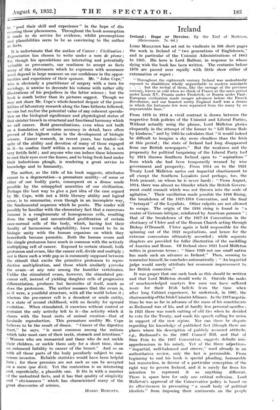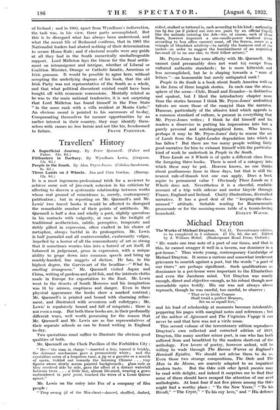Ireland
Ireland : Dupe or Heroine. By the Earl of Midleton. (Heinemann. 7s. fid.) LORD MIDLETON has set out to vindicate in 168 short pages the work in Ireland of "two generations of Englishmen," and in particular of the Unionist Administrations of 1885 to 1905. His hero is Lord Balfour, in response to whose dying wish the book has been written. The centuries before 1870 are passed over rapidly with little show either of extenuation or regret :
"Throughout the eighteenth century Ireland was undoubtedly exposed to disabilities wholly unjustifiable to modern standards . . but the recital of them, like the carnage of the previous century, leaves us cold when we think of France at the same period under Louis XV, Prussia under Frederick, or Russia under Paul : European civilization made meagre advances before the French Revolution, and our boasted merry England itself was a dream in which the fortunate few were separated from the many by an impenetrable haze."
From 1870 to 1914 a vivid contrast is drawn between the respective Irish policies of the Unionist and Liberal Parties.
Without actually using the phrase, Lord Midleton glories eloquently in the attempt of the former to "kill Home Rule by kindness," and by 1905 he calculates that "it would indeed be difficult to imagine a sky more cloudless than the Irish at this period ; the state of Ireland had long disappeared from our British newspapers." But the weakness and the propensity for political bargaining of the Liberal Party had by 1914 thrown Southern Ireland open to " aspirations " from which she had been temporarily weaned by wise government and prosperity. From 1914 on to the 1921 Treaty Lord Midleton metes out impartial chastisement to all except the Southern Loyalists (and perhaps, too, the Irish peasant, on whom he is never hard) : "From August, 1914, there was almost no blunder which the British Govern- ment could commit which was not thrown into the scale of agitation." Their vacillation made possible the 1916 Rising, the breakdown of the 1917-1918 Convention, and the final " betrayal " of the Loyalists. Other culprits are not allowed to escape. The origin of the 1916 rising is found in " a centre of German intrigue, reinforced by American gunmen " ; that of the breakdown of the 1917-18 Convention in the obstinacy of Ulster and of the Roman Church acting through Bishop O'Donnell. Ulster again is held responsible for the spinning out of the 1921 negotiations, and hence for the extreme concessions ultimately accorded ; while separate chapters are provided for fuller illustration of the meddling of America and Rome. Of Ireland since 1921 Lord Midleton writes in generous terms : "Since 1920 not one small nation has made such an advance as Ireland." Then, seeming to remember himself, he concludes automatically : "An impartial judge would surely attribute her economic improvement to her British connexion."
It was proper that one such book as this should be written and that Lord Midleton should write it. Outside the ranks of unacknowledged martyrs few men can have suffered more for their Irish beliefs fram the time when after long Cabinet experience, he undertook, in 1907, the chairmanship of the Irish Unionist Alliance. In the 1917 negotia- tions he was as far in advance of the mass of his constituents as Redmond was of his, and at hardly less personal sacrifice ; in 1921 there was much cutting of old ties when he decided to vote for the Treaty, and made his speech calling for union in support of the new regime. Nor can there be dispute regarding his knowledge of published fact (though there are places where his description of publicly assumed attitude, e.g., Redmond's to the 1907 Council Bill, and that of Sinn Fein to the 1917 Convention, suggests definite mis- apprehensions in his mind). Yet of the three adjectives, "impartial, well-balanced and sincere," used already in an authoritative review, only the last is permissible. From beginning to end his book is special pleading, honourable but remorseless, in favour of a particular conception of the right way to govern Ireland, and it is surely far from his intention to represent it as anything different. There is space here for only one critical reflexion. Lord Midleton's approval of the Conservative policy is based on its effectiveness in preventing "a small body of political idealists" from imposing their sentiments on the people of Ireland ; and in 1905, apart from Wyndham's indiscretion, the task was, in his view, three parts accomplished. But this is to disregard what has always been understood, and what the recent life of Redmond confirms, that in 1905 the Nationalist leaders had abated nothing of their determination to secure Home Rule; and if electoral results were any guide at all they had in the South numerically unchallengeable support. Lord Midleton lays the blame for the final settle- ment on intransigence and intrigue, whether of Liberal or Coalition Minister, Orange or Catholic fanatic, American or Irish gunman. It would be possible to agree here, without accepting the underlying dogmas of his book, that the old Irish Party was not representative of the South as a _whole, and that what political discontent existed could have • been bought off with economic concessions. Mentally related as he was to the main national tendencies, it is not surprising that Lord Midleton has found himself in the Free State "in the same rank with a villa resident at Monte Carlo." An obvious moral is pointed to his successors of to-day. Compensating themselves for meaner opportunities by an earlier interest in their country, they may identify them- selves with causes no less heroic and not like his, foredoomed



























 Previous page
Previous page